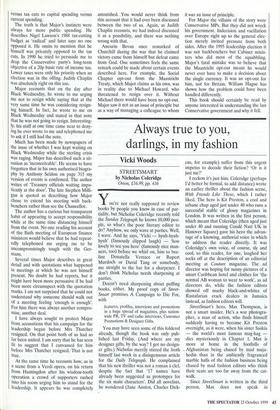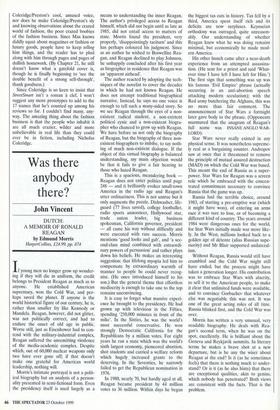Always true to you, darlings, in my fashion
Vicki Woods STREETSMART by Nicholas Coleridge Orion, f16.99, pp. 416 You're not really supposed to review books by people you know in case of par- tiality, but Nicholas Coleridge recently told the Sunday Telegraph he knows 10,000 peo- ple, so what's the poor literary editor to do? Anyhow, we only wave at parties. Well, I wave. And he says, 'Vicki — hyuh-hyuh- hyuh' (famously clipped laugh) — 'how lovely to see you here' (famously nice man- ners, too) before we whirl on, him to bee- line Donatella Versace or Rupert Murdoch or David Tang or somebody, me straight to the bar for a sharpener. I don't think Nicholas needs sharpening at parties.
Doesn't need sharpening about puffing books, either. My proof copy of Street- Smart promises A Campaign to Die For, with
features, profiles, interviews and promotions in a huge spread of magazines, plus nation- wide PR, TV and radio interviews, Customer Promotions & Designer Gifts.
You may have seen some of this folderol already, though the book was only pub- lished last Friday. (And where are my designer gifts, by the way? I got no design- er gifts.) Nicholas merrily stirred the froth himself last week in a disingenuous article for the Daily Telegraph. He complained that his new thriller was not a roman h clef, despite the fact that '17 names have already been suggested as prototypes for the six main characters'. Did all novelists, he wondered (Jane Austen, Charles Dick-
ens, for example) suffer from this urgent impetus to decode their fiction? 'Or is it just me?'
I reckon it's just him. Coleridge (perhaps I'd better be formal, to add distance) wrote an earlier thriller about the fashion scene, With Friends Like These, which I rather liked. The hero is Kit Preston, a cool and urbane chap aged just under 40 who runs a successful stable of glossy magazines in London. It was written in the first person, which meant that Coleridge (then aged just under 40 and running Conde Nast UK in Hanover Square) gave his hero the advan- tage of a knowing, authorial voice in which to address the reader directly. It was Coleridge's own voice, of course, sly and cool, so this reader, for one, laughed her socks off at the description of an editorial meeting at Couture magazine. The ad director was hoping for sunny pictures of a smart Caribbean hotel and clothes for 'the normal AB woman to wear to work', as ad directors do, while the fashion editors showed off murky black-and-whites of Rastafarian crack dealers in Jamaica instead, as fashion editors will.
StreetSmart's hero, Max Thompson, is not a smart insider. He's a war photogra- pher, a man of action, who finds himself suddenly having to become Kit Preston overnight, as it were, when his sister Saskia — the world's most famous mag-hag dies mysteriously in Chapter 1. Max is more at home in the foothills of . Afghanistan being chased by mad muja- hedin than in the ambiently fragranced marble halls of the fashion business being chased by mad fashion editors who think their seats are too far away from the cat- walk.
Since StreetSmart is written in the third person, Max does not speak in Coleridge/Preston's cool, amused voice, nor does he make Coleridge/Preston's sly and knowing observations about the crazed world of fashion, the poor crazed boobies of the fashion business. Since Max knows diddly squat about magazines or fashion or luxury goods, people have to keep telling him things, and the reader has to plod along with him through pages and pages of dullish homework. (By Chapter 21, he still doesn't know what a gatefold cover is, though he is finally beginning to 'see the double benefit of a strong sell-through', thank goodness.) Since Coleridge is so keen to insist that StreetSmart isn't a roman a clef, I won't suggest any more prototypes to add to the 17 names that he's counted up among his reviews so far. I couldn't find many, any- way. The amazing thing about the fashion business is that the people who inhabit it are all much crazier, wilder and more unbelievable in real life than they could ever be in fiction, including Nicholas Coleridge.



















































































 Previous page
Previous page